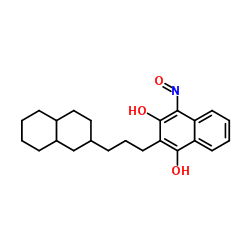Alteration of the expression of pesticide-metabolizing enzymes in pregnant mice: potential role in the increased vulnerability of the developing brain.
Marie C Fortin, Lauren M Aleksunes, Jason R Richardson
文献索引:Drug Metab. Dispos. 41(2) , 326-31, (2013)
全文:HTML全文
摘要
Studies on therapeutic drug disposition in humans have shown significant alterations as the result of pregnancy. However, it is not known whether pesticide metabolic capacity changes throughout pregnancy, which could affect exposure of the developing brain. We sought to determine the effect of pregnancy on the expression of hepatic enzymes involved in the metabolism of pesticides. Livers were collected from virgin and pregnant C57BL/6 mice at gestational days (GD)7, GD11, GD14, GD17, and postpartum days (PD)1, PD15, and PD30. Relative mRNA expression of several enzymes involved in the metabolism of pesticides, including hepatic cytochromes (Cyp) P450s, carboxylesterases (Ces), and paraoxonase 1 (Pon1), were assessed in mice during gestation and the postpartum period. Compared with virgin mice, alterations in the expression occurred at multiple time points, with the largest changes observed on GD14. At this time point, the expression of most of the Cyps involved in pesticide metabolism in the liver (Cyp1a2, Cyp2d22, Cyp2c37, Cyp2c50, Cyp2c54, and Cyp3a11) were downregulated by 30% or more. Expression of various Ces isoforms and Pon1 were also decreased along with Pon1 activity. These data demonstrate significant alterations in the expression of key enzymes that detoxify pesticides during pregnancy, which could alter exposure of developing animals to these chemicals.
相关化合物
| 结构式 | 名称/CAS号 | 分子式 | 全部文献 |
|---|---|---|---|
 |
酯酶 来源于猪肝脏
CAS:9016-18-6 |
C23H29NO3 |
|
Pathway Pattern-based prediction of active drug components a...
2013-03-01 [Mol. Biosyst. 9(3) , 375-85, (2013)] |
|
Vascular smooth muscle cells isolated from adipose triglycer...
2013-05-01 [Biochem. Biophys. Res. Commun. 434(3) , 534-40, (2013)] |
|
Neural stem cell-mediated delivery of irinotecan-activating ...
2013-12-01 [Stem Cells Transl. Med. 2(12) , 983-92, (2013)] |
|
Different hydrolases involved in bioactivation of prodrug-ty...
2013-11-01 [Drug Metab. Dispos. 41(11) , 1888-95, (2013)] |
|
Molecular characterization of two carboxylesterase genes of ...
2013-04-01 [Arch. Insect Biochem. Physiol. 82(4) , 213-26, (2013)] |